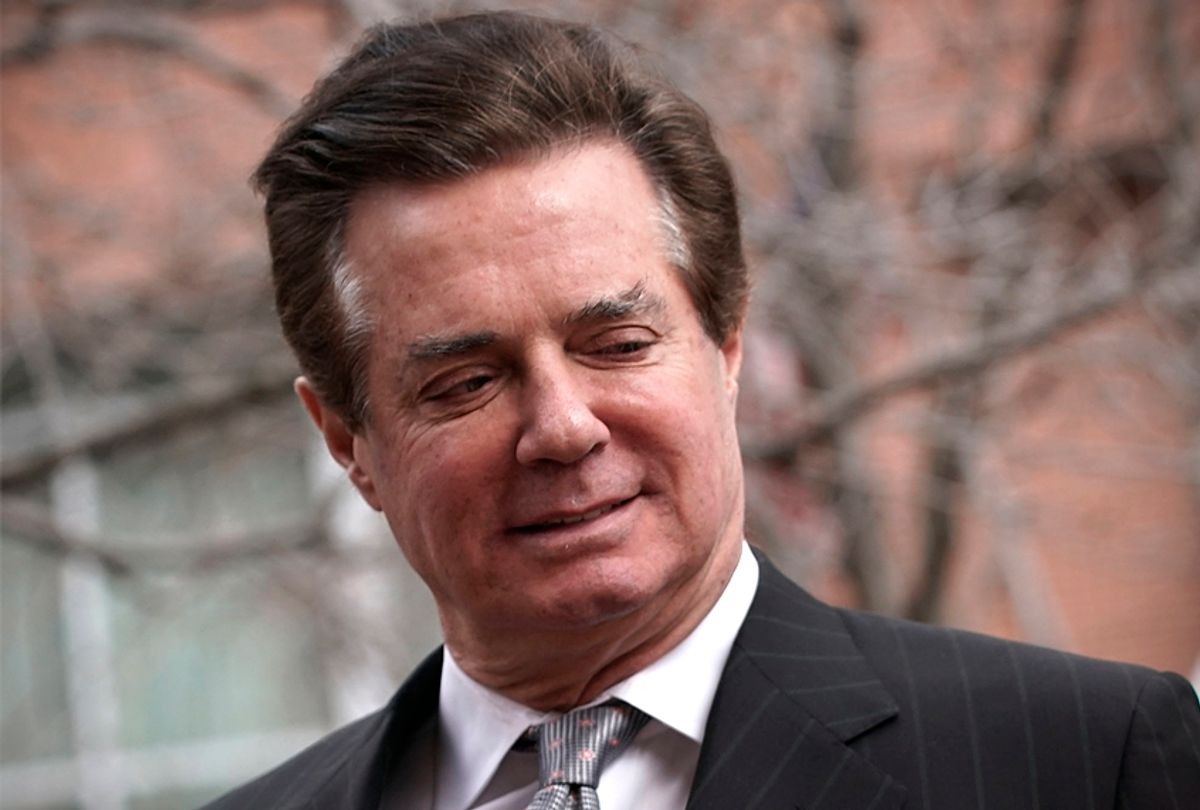Paul Manafort, the longtime Republican consultant who spent five months as President Donald Trump's campaign chairman during the 2016 election, was sentenced to less than four years in prison on Thursday as part of special counsel Robert Mueller's investigation into allegations of collusion between the commander-in-chief's presidential campaign and the Russian government.
Prosecutors had argued that under sentencing guidelines, Manafort, who appeared in the court in Virginia in a wheelchair and pleaded for compassion, should serve between 19 to 24 years in prison — essentially a life sentence for the 69-year-old — after he was convicted in August on eight counts of tax and bank fraud.
"Manafort acted for more than a decade as if he were above the law and deprived the federal government and various financial institutions of millions of dollars," the special counsel wrote in a memo. "The sentence here should reflect the seriousness of these crimes."
But U.S. District Court Judge T.S. Ellis III said the recommended decades-long term in prison would be "excessive" on Thursday, adding that he believed Manafort had "lived an otherwise blameless life."
"Let me be clear: The guidelines would suggest sentencing is a calculation. It is not," Ellis proclaimed. "It is a judgment."
Some legal experts and political observers were surprised by the relatively-light sentence Manafort received, and were quick to point out the gross inequalities between punishments for white-collar crime like Manafort's, which included illegal lobbying on behalf of pro-Russia political forces in Ukraine, hiding the millions of dollars he made in overseas bank accounts, falsifying business records and lying to banks to keep the cash flowing then urging witnesses to lie on his behalf when he was caught, and street crime, as well as the disparity between sentences for wealthy offenders versus everyone else.
MSNBC's chief legal analyst Ari Melber said on Twitter, "Paul Manafort's lenient 4-year sentence — far below the recommended 20 years despite extensive felonies and post-conviction obstruction — is a reminder of the blatant inequities in our justice system that we all know about, because they reoccur every week in courts across America."
"In our current broken system, 'justice' isn't blind, it's bought," tweeted Rep. Alexandria Ocasio-Cortez, D-N.Y., who has advocated for criminal justice reform.
Sen. Amy Klobuchar of Minnesota, a 2020 presidential candidate and former prosecutor, wrote on Twitter, "Guidelines there for a reason. ... Crimes committed in an office building should be treated as seriously as crimes committed on a street corner."
Rob Flaherty, who has worked for a host of progressive advocacy organizations, tweeted a link to an article about a black man who was sentenced to 12 years in Mississippi for medical marijuana he purchased legally in another state.
Scott Hechinger, a public defender at Brooklyn Defender Services in New York, which provides legal services to low-income people, highlighted the differences in the U.S. criminal justice system for the rich and the poor in a series of tweets.
"For context on Manafort's 47 months in prison, my client yesterday was offered 36-72 months in prison for stealing $100 worth of quarters from a residential laundry room," Hechinger wrote.
In another tweet, Hechinger shared a link to an article about a black woman who was sentenced to 5 years in Texas for voting while on probation. The woman argued she did not know a felony conviction barred her from voting.
Harvard Law School professor and Trump critic Laurence Tribe called Manafort's 47-month sentence "outrageously lenient." "Judge Ellis has inexcusably perverted justice and the guidelines," Tribe tweeted.
Former federal prosecutor Harry Litman tweeted that while Ellis is known for "arbitrary and capricious" sentencing, "This is a totally crazy and exorbitant departure."
"Aberrations like this are what led to Guidelines in the first place. A black eye for the justice system," Litman added.
Manafort faces another sentencing Wednesday in a separate federal case in Washington on separate charges brought forward by Mueller. In that case, Manafort faces a maximum of 10 years for lying to federal prosecutors, the FBI and a federal grand jury. Mueller's prosecutors have so far not taken a position on what Manafort's sentence should be, although they are expected to weigh in during the Washington hearing on whether Manafort should serve his two sentences concurrently or consecutively.
The sentence imposed by Ellis will likely impact how harsh U.S. District Court Judge Amy Berman Jackson is next week in her sentencing. Another plausible outcome could involve a presidential pardon, which Trump said he has not ruled out.
"It was never discussed, but I wouldn't take it off the table. Why would I take it off the table?" Trump said last November. At the time, Democratic Rep. Jerry Nadler of New York, the chairman of the House Judiciary Committee, warned Trump that "even dangling a pardon" for Manafort "would fortify a claim or charge of obstruction of justice."
But a presidential pardon would not extend to legal action at other levels of government. Manhattan District Attorney Cyrus Vance Jr. is ready to file tax and other charges against Manafort in the event that he receives a presidential pardon.



Shares